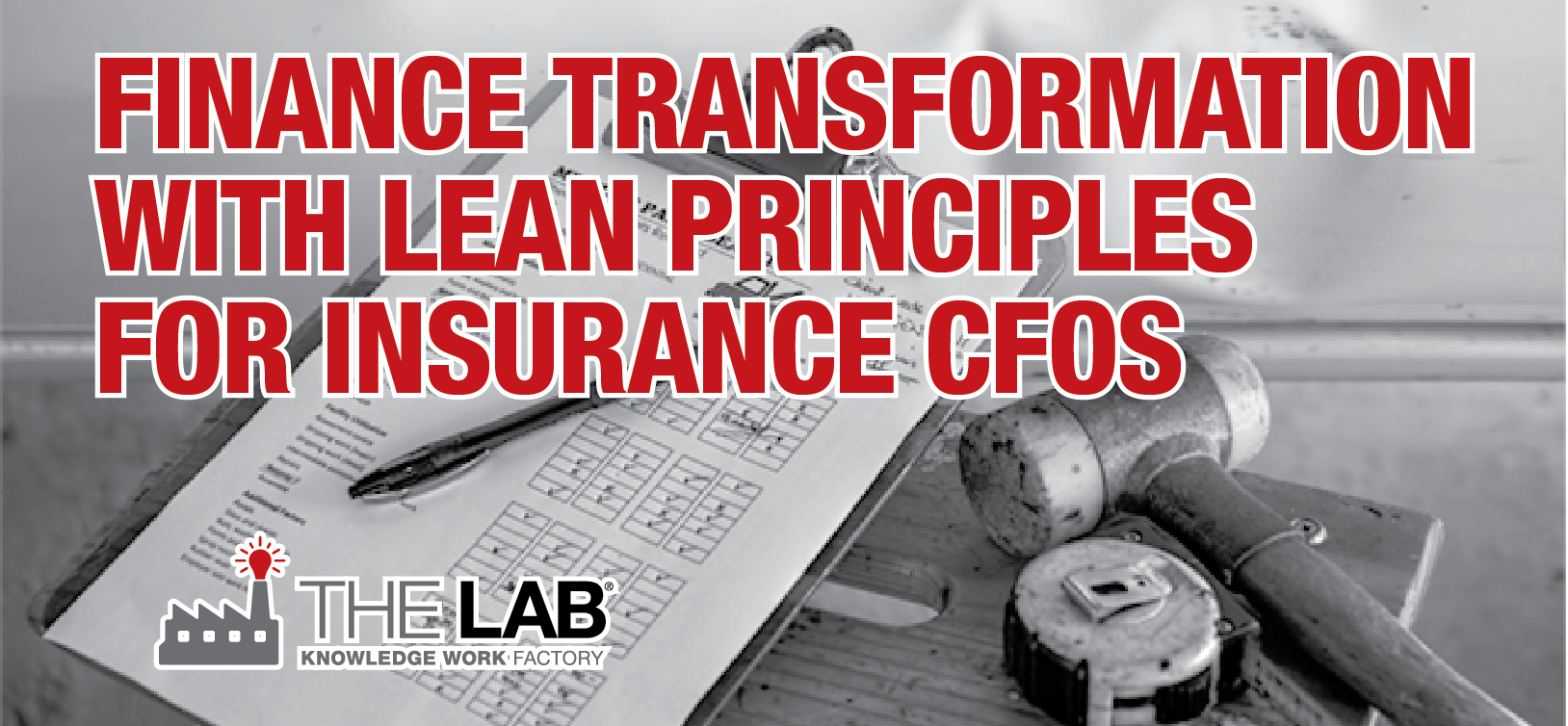Our last blog article discussed the challenges of lean finance management transformation in hospitals. In this article, we’re sticking to the topic of lean finance transformation. But we’re changing the venue to insurance. Are there more similarities than differences? Read on, and decide for yourself.
Finance transformation with lean principles and the CFO in the hot seat
The stories in this article are compiled from numerous finance transformation engagements which The Lab Consulting has had with multiple insurance companies, covering various lines: property, casualty, life, and so on. Yet they always seem to feature a CFO who’s trying, hard, to get a handle on his or her situation. “What’s our loss reserve? How many accidents have there been? How can we get actionable data to not only keep our shareholders informed, but to make better strategic decisions for the business?”
And we’re not even talking about catastrophic losses here. Wall Street will give companies a pass on those. We’re talking about the day-to-day challenges of leaning out an insurance company’s financial group, so that it can effect the lean finance transformation it desires.
What exactly is “lean finance transformation” in insurance?
This question is more complex than it at first may appear. When The Lab is brought in to an insurance company by, say, its CFO, the wish-list seems to be pretty straightforward:
- Many will want to centralize their often-far-flung activities into a finance shared services center.
- They will want to standardize finance operations activities and reduce costly variation.
- They’ll seek to automate what processes can be profitably automated. For example, they would like the ability for their financial-reporting organizations to self-report, shortening vital cycle times.
We can add to that list, with granular goals such as:
- Optimize and transform the financial close process.
- Refine and reduce finance and accounting operations activities.
- Enable data visualization for business insights in the financial planning and analysis (FP&A) organization.
We’ve had insurance finance operations clients tell us that they want to, say, shave a day off of the close process. That’s laudable. But it’s not “lean finance transformation.” Certainly the accounting logjam of clogged general ledgers (more on that in a minute) leads to forecasting problems. But reducing the close process by one day won’t exactly excite your shareholders. That’s not “lean finance transformation” for your insurance company.
As one of The Lab’s project leads likes to put it, “Lean finance transformation means ‘How do we get out of the auditing-and-reporting business, and into the planning-and-analysis business?’ You can be precise at a subpar business and report it perfectly—or you can be ‘accurate enough’ to actually partner with your lines of business to help them manage their operations with facts and data.” That’s what we’d call a “lean finance transformation.”
Roadblocks CFOs face when implementing lean finance transformation in insurance
If you’re looking to transform your finance and accounting group operations with lean six sigma, there are lots of places to start. We’ve found, as a simple example, that tribal-based calendar cycles can be hard to break. “Why can’t we do pre-close activities and shorten the cycle?” might be a reasonable question. But the answer may be: “We don’t start until the 15th, because our accountants are used to taking their vacations early in the month.” Which begs the follow-up question: “Why can’t you break that cycle?” It’s a matter of looking at an established way of doing things from a smarter perspective.
A bigger issue, as we’d hinted above, is the profusion of items on the general ledger. There can be tens, even hundreds of thousands of items, all diligently logged and tracked, when there shouldn’t be. We’ll see discrete items such as “Utilities Network,” “Utilities Video Conferencing,” “Utilities VoIP,” “Utilities WiFi 004,” and so on. This can be traced to individual finance knowledge workers controlling their own domains, with no mandate or guidance from above; thus everything rolls up from the bottom. Everyone makes their own decisions: Location A might “expense” one item, while Location B “capitalizes” it. Then it all pours into corporate, where all the apples and oranges must be laboriously sorted.
Materiality definitions impede lean insurance finance transformation for CFOs
So what’s the root of all this bloat? It would be too simplistic to simply blame the armies of accountants and finance operations staff. We have found, in insurance, that many companies tend to over-interpret the regulations they must follow. For example, would a requirement to report “anything that’s material enough to have a significant impact on the business” apply to a 50-dollar item… in a $1 billion insurance company? Of course not! But you’d be surprised how often this level of granularity becomes the norm. The result is that the finance group then drowns in the data of “false precision,” chasing down numbers when they should be sorting the truly material from the insubstantial, and using the newfound time for strategic decision-making.
(And this is to say nothing of the staffing over-capacity we routinely find among insurers, not to mention the misguided notion that faster adjusters tend to be overly generous in their payouts. We wrote an entire article about that one; read it here.)
Make your lean finance shared services transformation pay off
Our next article in this “lean finance transformation” series will focus on retail finance operations. Before you read it, consider your own lean finance transformation: Is your insurance firm’s financial group as lean as it can be? If not, consider booking a quick, no-obligation 30-minute phone call with The Lab. In that one call, we can show you how we’ve helped other insurers to lean out their finance groups, in just six months, without any new technology, all backed by a self-funding money-back guarantee.
Simply call (201) 526-1200 or email info@thelabconsulting.com to book your demo today!

















